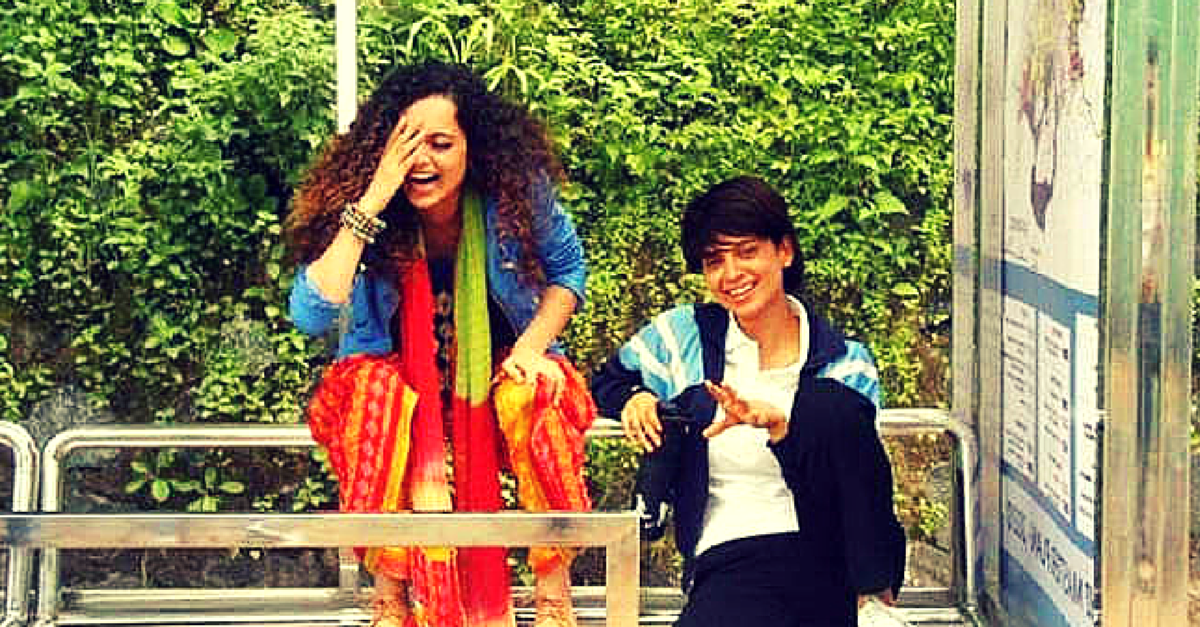Tanu Weds Manu Returns is a movie which we can relate to as an audience. Owing to this very fact, there are many life lessons which can be drawn from this movie and many aspects of life which can be pondered upon, as our reader Nalin Rai reveals.
A film that has become the first in 2015 to cross the 100 crore mark, has been able to do it because it is drenched in reality, has a script with which most of us can identify with, has locations where at some point of time or the other we must have traveled and has situations which we may be able to relate to personally.
Here are lessons which I personally took away from Tanu Weds Manu Returns:
1. Indians Need To Stop Hanging Their Clothes Outside Their Homes
Photo: www.emirates247.com
The dialogue in the film “South hall mein kachcha baahar sukhana kab band hoga” indeed takes a shot at our intrinsic characteristic of having a clothesline outside our balconies, where even the undergarments hang festooned as though trophies were hanging in the air. As a matter of fact, stand up comic Kapil Sharma had pointed it out succinctly in one of his shows, though it was not followed up.
2. Mental Illness Is Not A Subject To Be Pushed Under The Carpet
Photo: blog.simplymarry.com
While the world has recognized the fact that many suffer, at one point or another in their lives, from some kind of mental illness and that it is nothing to be embarrassed about, in India it is still treated as an anathema. Taking a cue from TWMR, one only hopes that now mental illness cases will begin to be brought out of the closets and that proper treatment for such illnesses will be initiated for those unfortunate to have been afflicted by them.
3. “Rickshaw-Wala Dost Nahee Ho Sakta Hai?”
Photo: www.boxofficeeye.com
After Tanu (Kangana Ranaut) plans to return home, she calls her friend, who now drives a rickshaw and meets him with the same zest as she used to do earlier. Her parents are left aghast that their daughter has a rickshaw-wala as a friend, but for Tanu it is not the official designation which matters, but the friendship which she shared with him when they studied together. It also points to the fact that some introspection is required where relationships are concerned, regarding whether they should be governed on the basis of official capacities or fondness for an individual.
4. Marriage Must Not Change The Behaviour Of the Family Towards Their Daughter And Parents Must Not Insist Upon The Same
Photo: www.hdwallpapersimages.com
As Indians, we still believe in the notion that after a girl has been married off, she does not belong to the house where she has grown up and when she comes back after marriage, she should not conduct herself the way she used to do when she used to live there. Kangana, however, through her portrayal of Tanu, has turned the argument around and highlighted the fact that girls should continue to lead the same life with the attitude which they upheld earlier. She accentuated this point through a bold statement made by walking out in a bath robe for a meeting concerning the discussion of a marriage proposal. Purists and traditionalists may scoff at it, but the general opinion needs to change for sure. After all, why should boys only have fun?
5. Artificial Insemination Can Save Many Girls From Societal Taunts
Another character in the film, played by Swara Bhaskar, also needs acclamation as she presented the effects of a married life with a partner struck by male infertility and how, in a predominantly male dominated society, the girl, through no fault of hers, still has to face social brickbats. Many married lives can be saved if the male ego can be put aside and the process of artificial insemination adopted. Where ‘Vicky Donor’ underlined it, TWMR dabbled in it on a practical front.
6. Never Lose Your Swagger
TWMR seemed to have done justice to the importance of “swagger” in the life of an individual. And since I don’t know any word for it in Hindi that is capable of presenting the same impact, the choice of the English word delivers it with a punch. Paeans have been written about the walk of a woman and all of them seem to put emphasis on the coyness. However, TWMR unravels the facet of swagger by underling the fact that it is the confidence of the walk which should establish the confidence of the woman.
– Nalin Rai
Like this story? Or have something to share? Write to us: contact@thebetterindia.com, or connect with us on Facebook and Twitter (@thebetterindia).
We bring stories straight from the heart of India, to inspire millions and create a wave of impact. Our positive movement is growing bigger everyday, and we would love for you to join it.
Please contribute whatever you can, every little penny helps our team in bringing you more stories that support dreams and spread hope.


